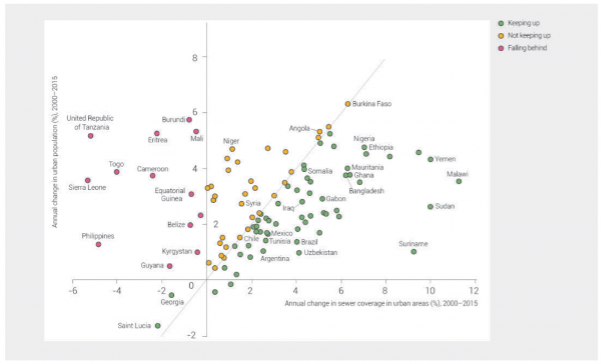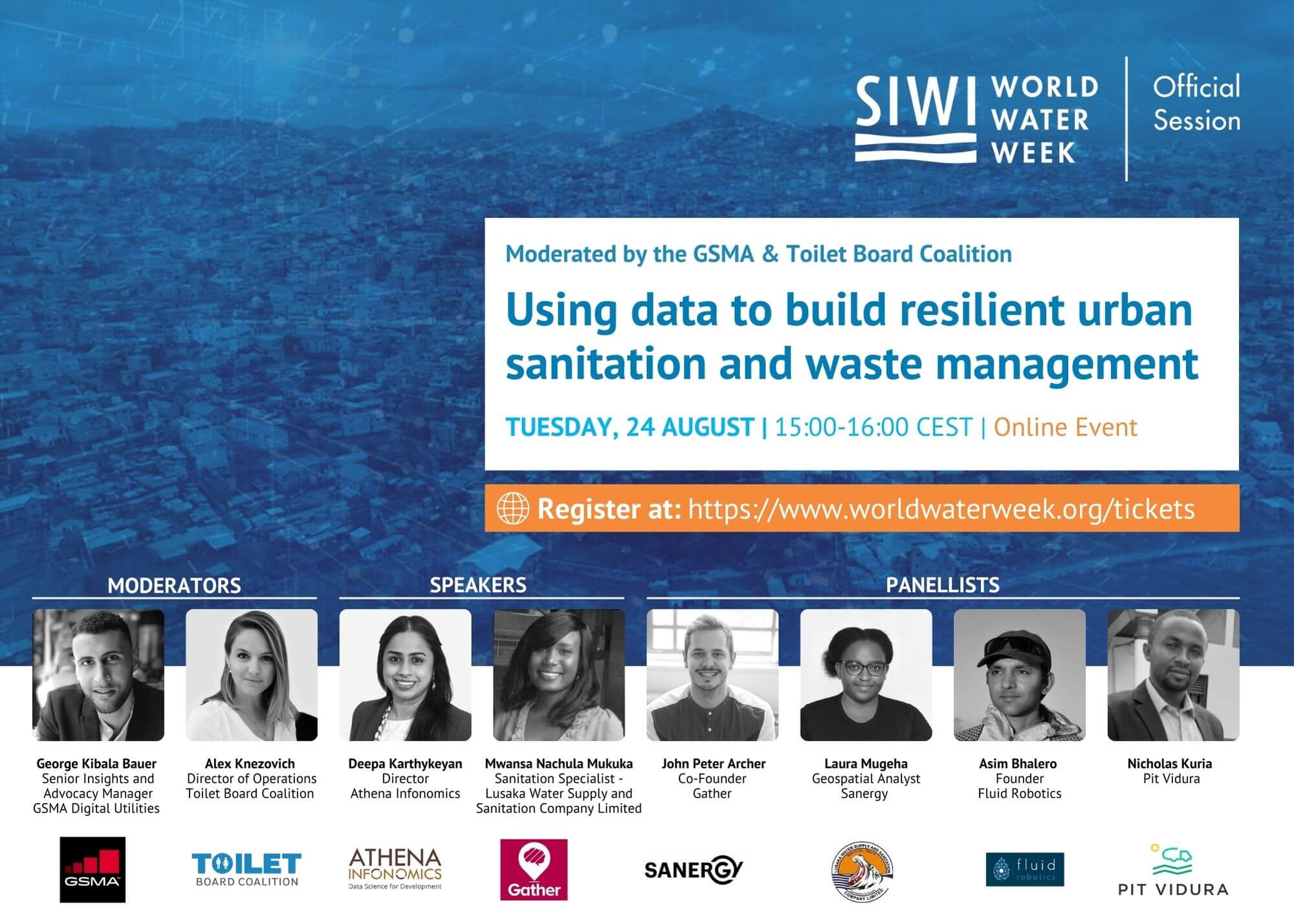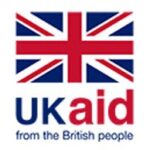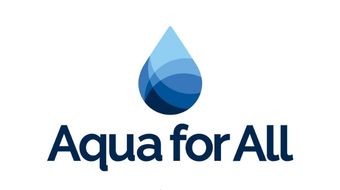We, the GSMA Digital Utilities programme and the Toilet Board Coalition, are hosting a session at World Water Week on ‘Using data to build resilient urban sanitation and waste management’. The session will take place on 24th of August at 3-4pm (CEST). The event is open to the public to join. Here is why you should join and what you can expect to learn from the session:
Setting the scene
Urban population growth continuously outpaces gains in improved sanitation access. More than half of the world’s population is now urban, representing approximately 3.9 billion people, nearly 1 billion of whom live in informal settlements. Providing sewer access to low-income urban populations is proving particularly challenging. Between 2000-2015, in 54 out of 120 selected low- and middle-income countries (LMICs), sewer access growth did not keep pace with urban population growth (see figure below).
Urban population growth versus sewer coverage growth in urban areas, 2000–2015

It will be impossible to attain not only SDG6, but also SDG 11 (sustainable cities and communities), if there is not a greater focus on how LMICs approach, fund, plan, and design urban sanitation service provision. Such a shift has to be informed by data in order for policy interventions to truly respond to the unique realities of low-income populations living in informal settlements, while also taking into account broader systemic challenges such as climate change and their implication for urban sanitation systems. Cities with large informal settlements require innovative approaches to sanitation service provision.
Yet data scarcity in urban sanitation is often characterised by a fragmented sanitation value chain that does not collect data on a range of activities, preventing public, private and civil society stakeholders from effectively collaborating along different components of the value chain (from emptying to disposal). Without coordinated and comprehensive data collection on the capture, storage, transport, treatment and reuse of faecal waste, it is difficult to identify, implement, and track solutions that meet the needs of low-income urban populations.
The challenge of data scarcity is compounded by lacking financial resources and institutional capacity to establish (real-time) public data monitoring platforms that can provide insights on vital issues such as service delivery, or property rights. Additionally, many traditional data sources face major limitations, such as the cost and complexity of capturing data, the challenge of interpreting static data in a dynamic world, and the need to protect personal data from exploitation.
Increasingly, private sanitation providers are leveraging digital tools to create new records of consumer behaviour and demand patterns. Specialists as well as service providers themselves have also grown more efficient in tailoring geospatial analyses for the context of urban sanitation. In combination with traditional administrative datasets, and survey data, municipalities and utilities can leverage different types of innovative data sources to plan more resilient urban sanitation and waste management systems.

Session Outline and Speakers
Our session will focus on how innovative data can help public and private sector stakeholders plan for and invest in more resilient urban sanitation and waste-management systems; how public-private partnerships that leverage data can bring value to all stakeholders; and how data will be transforming the way we think about urban sanitation going forward.
It will feature a diverse group of sanitation start-ups, data analytics providers, and public sector stakeholders, and provide a case study, a panel discussion, and opportunities for audience engagement.
1. Case Study – Strengthening Public Sector Data Capacity for Inclusive Urban Sanitation – The Case of Lusaka Zambia
Athena Infonomics, a data-driven global consultancy, in collaboration with Aguaconsult and ESAWAS, has been supporting the Bill & Melinda Gates Foundation to develop a citywide sanitation planning tool. This tool was piloted in collaboration with National Water and Sanitation Supply Council (NWASCO) and Lusaka Water Supply and Sanitation Company (LWSC). Deepa Karthykeya, a Director at Athena Infonomics and Mwansa Nachula Mukuka, Sanitation Specialist at Lusaka Sanitation Program, LWSC will talk about how strengthening data systems equips utilities with the tools and information to drive more inclusive urban sanitation services.
2. Panel Discussion – Big Data Beyond The Hype – Perspectives from Pune, Antananarivo, Kigali, and Nairobi
- John Peter Archer, Co-Founder Gather: Gather’s mission is to close the sanitation data gap. It partners with municipal sanitation organisations and help them collect, share and analyse data so that they can get toilets to people in their communities who need them most. Check out their Antananarivo Sanitation Data Hub project to learn more
- Laura Mugeha, Geospatial Analyst, Sanergy: Sanergy provides non-sewered sanitation solutions that serve urban residents in Kenya. Sanergy partnered with the Spatial Collective to utilize GIS mapping and drone imagery to understand service gaps in the informal urban settlements of Viwandani and plan for the roll-out of its services.
- Asim Bhalero, Founder, Fluid Robotics: Fluid Robotics is a start-up providing products and services that enable better management of water and wastewater infrastructure. Through the use of Robotics and Information Technology the company is helping cities take control of water pollution caused due to untreated wastewater entering lakes, rivers and ground water.
- Nicholas Kiura, PitVidura: Pit Vidura develops the tools and technologies to enable safe and affordable fecal waste collection services for the world’s poorest urban households. They’re look at customer data revealed that a clustering approach could optimise logistics routes and strengthen the business model.

Given that conversations around data for development often seem quite high-level and somewhat divorced from the realities of citizens, policy makers and end-users, we hope that this session will provide great opportunity to go beyond the hype to assess which uses cases and partnership models are particularly promising, and learn from a range of stakeholders that have a track record of implementing and assessing data-driven solutions in sanitation.
The GSMA Digital Utilities programme, and the Toilet Board Coalition’s look forward to welcoming you all at our session and please do not hesitate to get in touch if you have any questions!
The Digital Utilities programme is funded by the UK Foreign, Commonwealth & Development Office (FCDO), and supported by the GSMA and its members.







